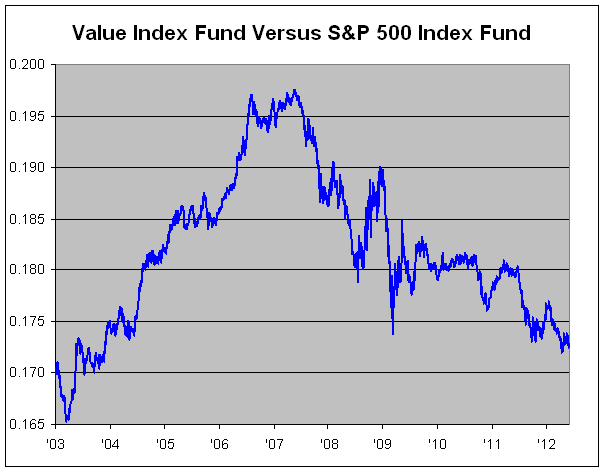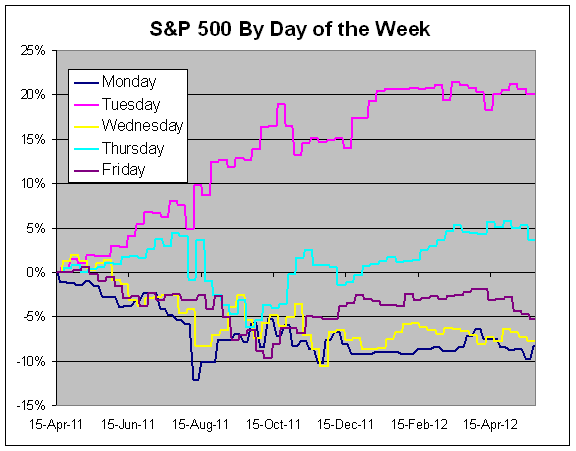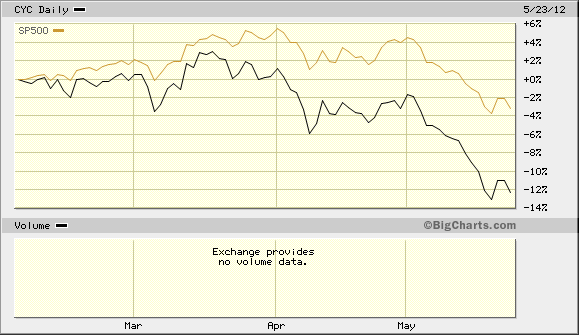Archive for May, 2012
-
Thanks Vets
Eddy Elfenbein, May 27th, 2012 at 11:48 am -
Four Up Days in September
Eddy Elfenbein, May 25th, 2012 at 5:49 pmHere’s a factoid that caught my attention:
The Dow has seen only four “up” days this month, which is tied for the least number of positive days in a month during the index’s history, according to WSJ Market Data Group.
The only other month with this few positive trading days was September 1903.
Of course the month isn’t over just yet.
-
Analyst Thinks Hudson City Could Go For $8.25
Eddy Elfenbein, May 25th, 2012 at 4:58 pmMatthew Kelley, an analyst at Sterne Agee, thinks Hudson City Bancorp ($HCBK) could go for $8.25 in a buyout, but only if the bank makes some big changes.
Kelly said that “earnings power at HCBK will continue to suffer in a sustained low interest rate environment, in our view,” and that the company was “expected to announce changes to its business plan (add mortgage banking),” and that a third restructuring of borrowings was “not out of the question.”
The analyst said that mortgage loan prepayments were continuing to pressure Hudson City’s margins, and that because Fannie Mae (FNMA) and Freddie Mac (FMCC) have raised their dollar limits on the “conforming” mortgage loans that they will buy, “the pool of jumbo mortgages which has wider spreads (without government guarantees),” and has been a traditional focus for the company, “is smaller.”
Going forward, options for Hudson City “include a push into a less capital-intensive mortgage banking,” focusing on quickly selling newly originated conforming mortgages to generate gains-on-sale,” according to Kelley, who added that the company “may also be considering a move into non-residential lending (multi-family and commercial real estate),” with which Sterne Agee “would be more concerned,” because of “the lack of infrastructure, history and expertise in these areas.”
-
CWS Market Review – May 25, 2012
Eddy Elfenbein, May 25th, 2012 at 7:02 amBoy has May been a frustrating month for stocks! The S&P 500 nearly went for an entire month without two up days in a row. We finally ended that run this week but the mess in Greece seems to be getting worse, and Facebook ($FB) had one of the worst initial public offerings in years. This IPO was a disaster for individual investors.
Fortunately, the stock market regained some of its footing this week. The S&P 500 managed to rise four days in a row and closed at 1,320.68 on Thursday. The index is still down nearly 7% from the four-year high it reached in early April. What’s not getting a lot of attention is that analysts have been increasing their earnings estimates for next year. The S&P 500 is currently going for about 11 times next year’s earnings estimate. That’s a good bargain, but I prefer to be skeptical about earnings estimates that far into the future. Still, it’s an interesting trend to note.
In this week’s CWS Market Review, I’ll talk about some of the issues surrounding Facebook’s IPO and I’ll tell you why I think the stock is a terrible, rotten, awful deal for investors. This IPO almost perfectly captures everything that’s wrong with Wall Street today.
As messy as things seems to be, the good news for us is that well-run companies are still doing well. On our Buy List, for example, we had a very nice earnings report this week from Medtronic ($MDT). In a few weeks, I expect to see the company raise its dividend for the 35th year in a row. Other standouts from our Buy List include Bed Bath & Beyond ($BBBY) which is close to a new all-time high. Also, Reynolds American ($RAI) has snapped back very impressively. But first, let’s take a closer look at the stock that’s on everyone’s mind: Facebook.
Don’t Invest in Facebook
Last Friday, Facebook ($FB) started trading as public company. This was the dream of all the investors who put money into the social networking company that was started in a Harvard dorm room eight years ago. Even before the shares started trading, there were problems. This was the second-largest IPO in U.S. history and the market was flooded with orders. The heavy demand caused trading in FB to be delayed for 30 minutes.
Almost every aspect of this offering was a mess. And what’s especially frustrating is that at every turn, individual investors were punished. Facebook simply got greedy and asked for too much money. However, I can’t put too much blame on a company for trying to get money for cheap. However, I can blame the bankers for not serving the best interest of their clients. The entire syndicate misjudged the interest in Facebook.
We also learned that the underwriters cut their estimates on Facebook in the middle of the roadshow. That’s outrageous! And we still don’t even know why but it apparently led to some major investors jumping ship. It turns out that some institutional investors were told of the downgrade while others were not. Meanwhile, many inexperienced retail investors bought Facebook using market orders. Ugh, that’s a big mistake. These were most likely the orders that were filled as Facebook ran up to $45 shortly after it started trading. Trust me: Never, never, never buy an IPO using a market order. You will get a terrible fill.
The fun in Facebook didn’t last long, and the stock dipped below $31 on Tuesday. Here’s a stat for you: Every penny in FB is worth $5 million for Mark Zuckerberg. Measuring from the stock’s high point, Zuck lost $7 billion. Between you and me, I think he’ll be okay.
Now let’s look at some numbers and we can clearly see that Facebook is wildly over-valued. The Street currently thinks FB can earn 65 cents per share next year. That’s almost certainly too low. To be safe, let’s say that Facebook can earn $1 per share in 2013. The estimated five-year earnings growth rate for Facebook is 35.9%.
If we take my patented “World’s Simplest Stock Valuation Measure,” (PE Ratio = Growth Rate/2 + 8 ) we get a fair value for Facebook of $25.95. This isn’t a precise measure for every stock, but it’s a quick and easy way to get a reasonable estimate. Still, this means that Facebook is over-valued by over 20$. The shares aren’t even close to being a good buy.
I can’t say that Facebook will suddenly plunge to $26, but the true value will eventually win out. My advice is to stay away from Facebook.
Look Forward to Medtronic’s 35th Straight Dividend Increase
On Tuesday, Medtronic ($MDT) reported fiscal Q4 earnings of 99 cents per share. That was one penny more than Wall Street was expecting and a 10% increase over last year. In February, Medtronic told us to expect Q4 earnings to range between 97 cents and $1 per share.
I was impressed by Medtronic this past year. Two years ago, the company had to lower its full-year forecast a few times. Even though the overall downgrade wasn’t that much, the Street was highly displeased. But last year, Medtronic gave us a full-year forecast of $3.43 to $3.50 per share and they stuck with it all year. In the end, the company earned $3.46 for the year which was right in the range.
The good news for Medtronic is that demand is returning for their pacemakers and defibrillators. For Q4, Medtronic’s revenues rose by 4% to $4.3 billion. For 2013, Medtronic sees earnings ranging between $3.62 and $3.70 per share. The Street was expecting $3.66 per share. Officially, that will be reported as “inline guidance” but I’m very pleased with it.
Sometime next month, I expect Medtronic will raise its quarterly dividend. The current payout is 24.25 cents per share which works out to a yearly dividend of 97 cents per share (or 2.62%). If I had to guess, I think it will be a modest increase—to 25 or 26 cents per share. This will mark their 35th-straight dividend increase. Medtronic is a solid buy anytime the stock is below $40 per share.
Looking at some of our other Buy List stocks, Ford ($F) had some very good news when Moody’s raised their debt to investment grade. This will help lower their borrowing costs. Few things can cut into a company’s profit margin like escalating borrowing costs. Three years ago, Ford needed to sell 3.4 million units in North America to break even. Today that figure is down to 1.8 million. I think Ford should be a $20 stock.
In last week’s CWS Market Review, I highlighted some of our higher-yielding stocks. I’m happy to see that Reynolds American ($RAI) responded by reaching its highest closing price in two months. RAI currently yields 5.63%.
The media paid a lot of attention to a patent trial that Oracle ($ORCL) brought against Google ($GOOG). I never thought this was a big deal. Oracle claimed that Google infringed on some of their patents with the Android software. The jury said no. One expert said the trial was “something like a near disaster for Oracle.” Financially, this is minor. Oracle continues to be a very strong buy here.
That’s all for now. The stock exchange will be closed on Monday for Memorial Day. I hope everyone has an enjoyable three-day weekend. Be sure to keep checking the blog for daily updates. I’ll have more market analysis for you in the next issue of CWS Market Review!
– Eddy
-
So Where’s the Value Premium?
Eddy Elfenbein, May 24th, 2012 at 1:16 pmOne of the cornerstones of finance is that value stocks are supposed to outperform the overall market over the long haul. But value stocks have had a terrible time over the last five years. Much of this is due to the rotten performance of financial stocks, which tend to crowd the value indexes.
Bear in mind, I’m not talking about overall performance, but I’m lowering the bar to just beating the market — and value stocks have failed.
Here’s a look at the Vanguard Value Index Fund (VIVAX) divided by the Vanguard 500 Index Fund (VFINX). If you bought the Value Fund at any time since December 2003 and held on, you would have lost to the broader S&P 500 Index fund.
In the last few weeks, there’s been a minor rebound for value, but we’re quickly losing it. We may establish a new relative performance low in the next few days.
-
High-Yield Checking Accounts
Eddy Elfenbein, May 24th, 2012 at 9:30 amCNNMoney looks at the 10 highest-yielding checking accounts:
Rates on high-yield checking accounts continue to fall, but some banks and credit unions are offering deals that let you earn far more on your cash than many other banking products out there, according to Bankrate’s annual survey.
The average high-yield checking account earns 2.05% annually, down from 2.56% last year and 3.30% in 2010, according to Bankrate’s survey.
While high-yield accounts often make customers jump through more hoops — like requiring a certain number of debit transactions per month, online bill pay or direct deposit — it can be worth it. At an average APY of 0.06%, standard interest-bearing checking accounts pay barely enough to notice.
And high-yield checking account rates also handily beat the next best alternative for liquid cash: online savings accounts.
“For account holders who can routinely meet the monthly requirements, high-yield checking accounts are a no-brainer cash investment,” said Greg McBride, senior financial analyst for Bankrate.com.
You can see a list of the highest-yielding accounts at the original story.
-
This Morning’s Economic Reports
Eddy Elfenbein, May 24th, 2012 at 8:45 amThere were two important economic reports this morning.
The Labor Department reported that initial unemployment claims fell by 2,000 to 370,000. The only problem is that last week’s number was revised up to 372,000 from 370,000.
The durable goods report showed an increase of 0.2%. However, when we take out transportation orders, there was a decrease of 0.6%.
-
Morning News: May 24, 2012
Eddy Elfenbein, May 24th, 2012 at 8:21 amEurope Shares Rebound After Sell-off, Caution Remains
UK Recession Deepens as GDP Shrinks
Drop in German Business Confidence May Portend Slowdown
China Manufacturing Activity Worsens: HSBC
Stock Futures Climb Ahead of U.S. Data
HP Rises as Profit, Job Cuts Buoy Optimism for Turnaround
Negative Equity Remains a Drag on Housing Market
Costco’s 3Q Net Income Rises, Sales Climb
-
Tuesdays Have Been the Big Winner
Eddy Elfenbein, May 24th, 2012 at 6:11 amHere’s a look at the stock market’s return by day of the week since April 15, 2011. If we took all the Mondays and put them together, the S&P 500 has lost 8.23%. But Tuesdays have been the big winner. The S&P 500 has gained 20.05% on the second day of the week.
On Wednesdays, the index has been down 7.72%. On Thursdays, it’s made a small gain of 3.66%. Then on Fridays, the S&P 500 has lost 5.23%.
-
The Cyclical Sell-Off
Eddy Elfenbein, May 23rd, 2012 at 11:04 amHere’s another view of how badly cyclical stocks have underperformed since early February. The gold line is the S&P 500 while the black line is the Morgan Stanley Cyclical Index.
The non-cylical part of the market hasn’t been damaged too badly.
-
-
Archives
- April 2025
- March 2025
- February 2025
- January 2025
- December 2024
- November 2024
- October 2024
- September 2024
- August 2024
- July 2024
- June 2024
- May 2024
- April 2024
- March 2024
- February 2024
- January 2024
- December 2023
- November 2023
- October 2023
- September 2023
- August 2023
- July 2023
- June 2023
- May 2023
- April 2023
- March 2023
- February 2023
- January 2023
- December 2022
- November 2022
- October 2022
- September 2022
- August 2022
- July 2022
- June 2022
- May 2022
- April 2022
- March 2022
- February 2022
- January 2022
- December 2021
- November 2021
- October 2021
- September 2021
- August 2021
- July 2021
- June 2021
- May 2021
- April 2021
- March 2021
- February 2021
- January 2021
- December 2020
- November 2020
- October 2020
- September 2020
- August 2020
- July 2020
- June 2020
- May 2020
- April 2020
- March 2020
- February 2020
- January 2020
- December 2019
- November 2019
- October 2019
- September 2019
- August 2019
- July 2019
- June 2019
- May 2019
- April 2019
- March 2019
- February 2019
- January 2019
- December 2018
- November 2018
- October 2018
- September 2018
- August 2018
- July 2018
- June 2018
- May 2018
- April 2018
- March 2018
- February 2018
- January 2018
- December 2017
- November 2017
- October 2017
- September 2017
- August 2017
- July 2017
- June 2017
- May 2017
- April 2017
- March 2017
- February 2017
- January 2017
- December 2016
- November 2016
- October 2016
- September 2016
- August 2016
- July 2016
- June 2016
- May 2016
- April 2016
- March 2016
- February 2016
- January 2016
- December 2015
- November 2015
- October 2015
- September 2015
- August 2015
- July 2015
- June 2015
- May 2015
- April 2015
- March 2015
- February 2015
- January 2015
- December 2014
- November 2014
- October 2014
- September 2014
- August 2014
- July 2014
- June 2014
- May 2014
- April 2014
- March 2014
- February 2014
- January 2014
- December 2013
- November 2013
- October 2013
- September 2013
- August 2013
- July 2013
- June 2013
- May 2013
- April 2013
- March 2013
- February 2013
- January 2013
- December 2012
- November 2012
- October 2012
- September 2012
- August 2012
- July 2012
- June 2012
- May 2012
- April 2012
- March 2012
- February 2012
- January 2012
- December 2011
- November 2011
- October 2011
- September 2011
- August 2011
- July 2011
- June 2011
- May 2011
- April 2011
- March 2011
- February 2011
- January 2011
- December 2010
- November 2010
- October 2010
- September 2010
- August 2010
- July 2010
- June 2010
- May 2010
- April 2010
- March 2010
- February 2010
- January 2010
- December 2009
- November 2009
- October 2009
- September 2009
- August 2009
- July 2009
- June 2009
- May 2009
- April 2009
- March 2009
- February 2009
- January 2009
- December 2008
- November 2008
- October 2008
- September 2008
- August 2008
- July 2008
- June 2008
- May 2008
- April 2008
- March 2008
- February 2008
- January 2008
- December 2007
- November 2007
- October 2007
- September 2007
- August 2007
- July 2007
- June 2007
- May 2007
- April 2007
- March 2007
- February 2007
- January 2007
- December 2006
- November 2006
- October 2006
- September 2006
- August 2006
- July 2006
- June 2006
- May 2006
- April 2006
- March 2006
- February 2006
- January 2006
- December 2005
- November 2005
- October 2005
- September 2005
- August 2005
- July 2005




 Eddy Elfenbein is a Washington, DC-based speaker, portfolio manager and editor of the blog Crossing Wall Street. His
Eddy Elfenbein is a Washington, DC-based speaker, portfolio manager and editor of the blog Crossing Wall Street. His